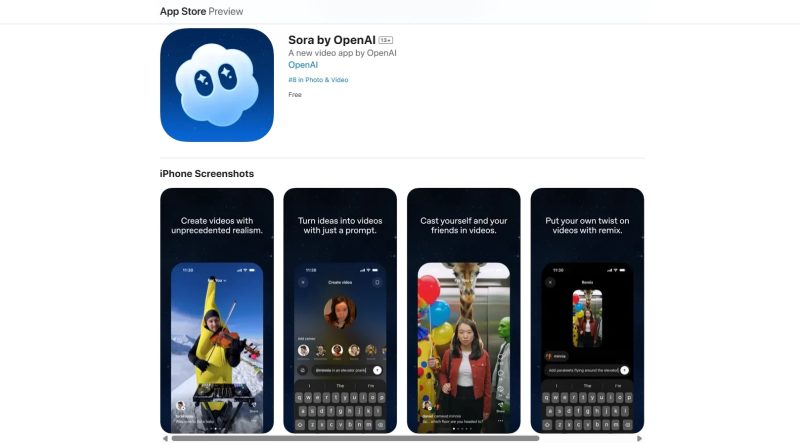OpenAI Launched Social Video App Sora 2: Everything You Need to Know
What is Sora 2?
OpenAI has taken a bold step into the social media space with the launch of Sora 2, a next-generation audio and video generation model paired with a social app simply called Sora. This new platform blends cutting-edge AI video creation with a TikTok-like social sharing experience, allowing users to generate and share hyper-realistic AI videos of themselves and their friends.
The Evolution from Sora to Sora 2
The first version of Sora, introduced last year, was impressive but often struggled with realism. Videos sometimes displayed “AI glitches,” like objects teleporting or characters bending in unnatural ways. With Sora 2, OpenAI has significantly improved physics accuracy and motion consistency, making generated videos appear more believable.
Why OpenAI Created a Social App Around Sora 2
Instead of treating Sora 2 as just another AI model, OpenAI is transforming it into a full-fledged social experience. By allowing users to share their AI creations in a short-form video feed, OpenAI positions Sora as both a creative tool and a competitor to TikTok, Instagram Reels, and Meta’s new “Vibes.”
Key Features of Sora 2
Improved Realism and Physics
Earlier AI video models often bent reality to satisfy prompts. For example, a missed basketball shot might magically teleport into the hoop. With Sora 2, physics-driven accuracy means the ball bounces off the backboard instead. This shift makes videos look far more natural.
The “Cameos” Feature
One of the most talked-about features is Cameos. Users can upload a short video of themselves to verify their identity and capture their likeness. From there, they can insert themselves into AI-generated videos — whether playing volleyball on the beach or pulling off skateboard tricks.
Sharing in a TikTok-Style Feed
Like TikTok and Instagram Reels, Sora’s app features a personalized feed where users can browse and share videos. This social-first design makes Sora more than just a creative tool — it’s a platform for viral AI entertainment.
iOS App Rollout
At launch, the Sora app is available on iOS in the U.S. and Canada, with plans for global expansion. Access is invite-only, though ChatGPT Pro subscribers may get early access to the Sora 2 Pro model.
How the Sora Social App Works
User Verification
To prevent abuse, Sora requires a one-time video and audio verification. This ensures uploaded likenesses are authentic, reducing risks of impersonation.
Invites and Pro Access
Currently, Sora is invite-only, but OpenAI is gradually rolling it out. If you’re a ChatGPT Pro user, you may already have access to Sora 2 without needing an invite.
AI-Driven Video Creation in Action
Examples of Sora 2 Videos
OpenAI has showcased volleyball rallies, skateboard stunts, gymnastics flips, and diving board cannonballs. These clips demonstrate how realistic Sora 2’s output has become, especially compared to its predecessor.
No More Teleporting Objects
Sora 2 enforces physical realism. Objects move as they should, avoiding surreal glitches. This makes the videos more trustworthy and engaging.
Personalization and Algorithm
How Recommendations Are Made
Like TikTok, Sora curates feeds based on user activity, engagement, and preferences. The algorithm also considers location (via IP) and ChatGPT conversation history — though this can be turned off.
Safety, Privacy, and Parental Controls
Risks of AI Likeness Sharing
Allowing friends to use your likeness in their videos introduces risks. Even well-meaning friends could misuse your AI likeness, leading to deceptive or harmful content.
OpenAI’s Safeguards
Users can revoke likeness permissions anytime. Still, non-consensual AI-generated videos remain a major societal issue, with few regulations in place.
Parental Supervision
Parents can use ChatGPT-based parental controls to set scrolling limits, turn off personalization, and manage direct messaging. However, these tools depend on parental tech skills.
Monetization Strategy
Free at Launch
To encourage exploration, Sora is free for now.
Paid Model in High Demand
OpenAI plans to charge users for extra video generation during peak usage times. This ensures servers can handle the load without overwhelming free users.
Competitors and Market Landscape
Comparison with TikTok and Meta’s Vibes
While TikTok and Instagram focus on real-world short videos, Sora offers AI-generated entertainment. Meta’s “Vibes” feature, launched last week, highlights how tech giants are racing to merge AI with video feeds.
Why Sora 2 Stands Out
Unlike its competitors, Sora’s AI-first approach puts creation and personalization at the center of the social experience.
The Future of AI Social Media Platforms
Global Expansion
With plans to roll out worldwide, Sora could become the first AI-native social platform to challenge mainstream apps.
Ethical Challenges
The rise of AI likeness sharing brings serious ethical questions. From deepfake abuse to misinformation, OpenAI will need to stay ahead of potential misuse.
FAQs
1. What is OpenAI’s Sora 2?
Sora 2 is an AI model for generating realistic audio and video, paired with a social app for sharing AI-generated clips.
2. How is Sora 2 different from the first version?
It enforces physical realism, avoiding glitches like teleporting objects.
3. What is the Cameos feature?
Cameos let users upload their likeness and insert themselves into AI-generated videos.
4. Is the Sora app free?
Yes, Sora is free at launch, but OpenAI may charge for extra video generation during peak demand.
5. Where is Sora available?
Currently on iOS in the U.S. and Canada, with plans for expansion.
6. What are the risks of using Sora?
Risks include misuse of AI likenesses and potential creation of non-consensual videos.
Conclusion
The launch of Sora 2 and its linked social app marks a new chapter in AI-driven creativity and social networking. By merging realistic video generation with a TikTok-style sharing experience, OpenAI is entering uncharted territory. While the app’s features like Cameos open up exciting creative possibilities, they also raise serious ethical and privacy concerns. If managed responsibly, Sora could reshape not just how we create content but how we interact socially in an AI-powered world.
🔗 For more context, you can check the official announcement on OpenAI’s blog.


